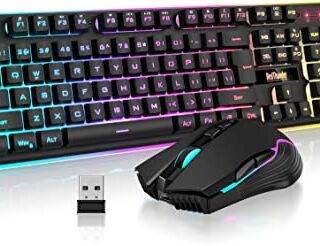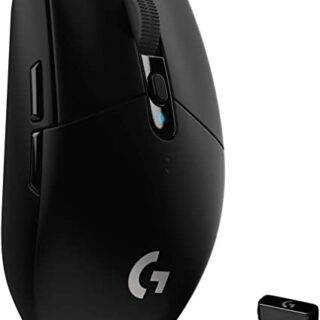Table of Contents
ToggleInformation
High-performance processors are essential for gaming. Modern games require fast, efficient CPUs like this. AMD and Intel make most gaming CPUs. High clock rates and single-core performance make Intel’s Core i9-11900K a popular choice for gaming. It’s from Intel’s 11th generation and popular with gamers. AMD’s Ryzen 9 5950X flagship chip has garnered attention. Its Zen 3 architecture, 16 cores, and 32 threads make it a gaming and productivity powerhouse. High-performance gamers and content developers choose the Ryzen 9 5950X.
Intel’s Core i7-11700K and AMD’s Ryzen 7 5800X offer performance and price. Ryzen 7 5800X has 8 cores and 16 threads, whereas Core i7-11700K has 8 cores and fast clock speeds. Both CPUs handle demanding jobs and perform well in games. Intel Core i5-11600K is budget-friendly. Its 6 cores and fast clock speeds give good gaming performance at a lower price.
New CPUs are released often in the CPU market. To choose a high-performance gaming processor, keep up with releases and reviews. The CPU should match personal tastes, budget, and gaming needs.
Intel Core i9-11900K
The Intel Core i9-11900K is a super fast processor and part of Intel’s latest 11th gen lineup. Yo, this thing dropped in March 2021 and it’s made for gamers and enthusiasts who want the best performance out there. The Core i9-11900K has got 8 cores and 16 threads, so it can handle tough tasks without breaking a sweat. For one-core jobs, it can go up to 5.3 GHz from 3.5 GHz. This thing’s clock speed is super high, which makes it really good for gaming and apps that need a lot of single-threaded power.
The processor uses Intel’s cool 10nm SuperFin process tech, which makes it super efficient and powerful. So basically, this thing needs some serious cooling to work at its best because it has a TDP of 125W. So, the i9-11900K has this cool thing called Thermal Velocity Boost (TVB) that lets it go faster than usual for a bit when it gets hot enough. For one-core jobs, it can go up to 5.3 GHz from 3.5 GHz.
Yo, the i9-11900K works with Intel’s LGA 1200 socket and can handle DDR4 memory with a max frequency of 3200 MHz. It has Intel UHD Graphics 750, however gamers may desire a separate graphics card. The Intel Core i9-11900K destroys gaming, especially single-threaded programs. Gamers and hobbyists who don’t mind spending more on a high-performance CPU prefer it.
Pros of Intel Core i9-11900K:
- Excellent Gaming Performance: The Core i9-11900K offers impressive gaming performance, particularly in applications that rely heavily on single-threaded performance. Its high clock speeds and strong single-core performance make it well-suited for demanding gaming experiences.
- Multi-Core Performance: With 8 cores and 16 threads, the i9-11900K excels in multi-threaded tasks such as content creation, video editing, and 3D rendering. It can handle demanding workloads efficiently, making it suitable for both gaming and productivity tasks.
- Thermal Velocity Boost: Intel’s Thermal Velocity Boost technology allows the i9-11900K to temporarily exceed its maximum turbo frequency under specific thermal conditions. This feature provides an extra performance boost when needed, enhancing overall responsiveness and performance.
- Advanced Technology: The i9-11900K is built using Intel’s advanced 10nm SuperFin process technology, which helps improve power efficiency and overall performance. It incorporates the latest technologies to deliver a high-performance computing experience.
Cons of Intel Core i9-11900K:
- High Power Consumption: The i9-11900K has a relatively high TDP (Thermal Design Power) of 125W. As a result, it can consume more power and generate more heat compared to some other processors. Adequate cooling is essential to maintain optimal performance and prevent overheating.
- Pricing: Being a high-end processor, the i9-11900K comes with a premium price tag. It may not be the most cost-effective option for budget-conscious users or those who don’t require its maximum performance capabilities.
- Limited Overclocking Potential: Some users have reported that the i9-11900K has limited overclocking potential compared to previous-generation Intel processors. Overclocking enthusiasts may find better results with alternative options.
- Competition from AMD: AMD’s Ryzen processors offer strong competition to Intel’s offerings. Depending on specific requirements and budget, some users may find better value or performance in AMD’s Ryzen lineup, especially considering their strong multi-threaded performance.
- It’s important to consider individual needs, budgets, and specific use cases when evaluating the pros and cons of the Intel Core i9-11900K or any other processor. Ultimately, the choice should align with your requirements and preferences.
AMD Ryzen 9 5950X
AMD’s Ryzen 5000 series includes the high-performance Ryzen 9 5950X. AMD’s Zen 3 architecture, released in November 2020, improves performance and efficiency. Power users, multimedia makers, and gamers need multi-threaded performance from the Ryzen 9 5950X. 16 cores and 32 threads make it one of the most powerful consumer processors. Its large core count makes video editing, 3D rendering, and multitasking easy.
The Ryzen 9 5950X excels on single- and multi-threaded tasks with 3.4 GHz base and 4.9 GHz turbo frequencies. AMD’s Precision Boost 2 and Precision Boost Overdrive technology alter its clock speeds based on workload. The processor’s 7nm manufacturing technique boosts power efficiency and performance. For a processor with so many cores, its 105W TDP is efficient. The Ryzen 9 5950X supports PCIe 4.0 technology for graphics cards and storage and is compatible with AM4 socket motherboards. AMD’s Infinity Fabric technology optimizes CPU core connectivity and performance. An integrated memory controller enables DDR4 memory up to 3200 MHz.
The Ryzen 9 5950X performs well in gaming, content creation, and professional workloads, earning praise. The processor’s superior performance comes at a higher price than other CPUs. The multi-threaded AMD Ryzen 9 5950X is perfect for enthusiasts and professionals.
Pros of AMD Ryzen 9 5950X:
- Exceptional Multithreaded Performance: With 16 cores and 32 threads, the Ryzen 9 5950X delivers outstanding multithreaded performance. It excels in tasks that can utilize multiple cores simultaneously, such as content creation, video editing, 3D rendering, and multitasking. It offers a significant performance boost for power users and professionals.
- Strong Single-Threaded Performance: The Ryzen 9 5950X also performs admirably in single-threaded tasks, making it suitable for gaming and applications that rely heavily on single-core performance. Its high clock speeds and efficient architecture contribute to smooth and responsive performance.
- Advanced Zen 3 Architecture: Built on AMD’s Zen 3 architecture, the Ryzen 9 5950X benefits from improved instructions per clock (IPC) performance, enhanced power efficiency, and higher overall performance compared to its predecessors. It utilizes a 7nm manufacturing process, enabling a balance between power efficiency and high performance.
- PCIe 4.0 Support: The processor supports PCIe 4.0 technology, providing faster data transfer speeds for compatible devices such as high-end graphics cards and NVMe solid-state drives (SSDs). This allows for improved gaming experiences and faster storage access.
- Compatibility and Upgrade Path: The Ryzen 9 5950X is compatible with existing AM4 socket motherboards, providing an upgrade path for users with compatible systems. This allows users to take advantage of the processor’s performance without requiring a complete platform change.
Cons of AMD Ryzen 9 5950X:
- Higher Price: The Ryzen 9 5950X is a high-end processor with a premium price tag. It may be more expensive compared to other CPUs on the market, making it less accessible for budget-conscious users or those with less demanding workloads.
- Higher Power Consumption: The processor has a TDP (Thermal Design Power) of 105W, which means it can consume more power and generate more heat compared to processors with lower core counts. Adequate cooling and a capable power supply are important considerations when using the Ryzen 9 5950X.
- Availability and Supply: The Ryzen 9 5950X, like other high-demand processors, may face occasional availability and supply constraints, especially shortly after release. It is advisable to check for stock availability and consider alternatives if needed.
- Integrated Graphics: The Ryzen 9 5950X does not include integrated graphics. This means a dedicated graphics card is necessary for display output and gaming, which adds to the overall cost of the system.
- These pros and cons should be considered in the context of individual requirements, budget, and specific use cases. The Ryzen 9 5950X excels in multithreaded performance, making it a top choice for demanding workloads, but the higher price and power consumption should be taken into account when making a purchasing decision.
Intel Core i7-11700K
Intel’s 11th-generation Core i7-11700K is powerful. It was released in March 2021 for gamers, content makers, and enthusiasts who want a strong CPU without the flagship price. The 8-core, 16-thread i7-11700K can handle gaming and productivity. Its 3.6 GHz base clock and 5.0 GHz turbo boost enhance single-threaded programs like gaming. The i7-11700K uses Intel’s 10nm SuperFin manufacturing technology to boost power efficiency and performance. Its 125W TDP requires adequate cooling.
The processor supports DDR4 memory @ 3200 MHz and Intel’s LGA 1200 socket. It has integrated Intel UHD Graphics 750, although gaming requires an external graphics card. Intel’s Turbo Boost Max Technology 3.0 dynamically enhances the i7-11700K’s fastest cores for single-threaded tasks. Applications that use optimized cores can benefit from this. The Intel Core i7-11700K balances performance and price well. It can multitask and play games well. However, depending on needs and tastes, AMD’s Ryzen series may offer comparable or greater performance at comparable or lower prices.
Pros of Intel Core i7-11700K:
- Strong Single-Core Performance: The i7-11700K offers strong single-core performance, making it well-suited for gaming and applications that rely heavily on single-threaded tasks. Its high clock speeds and optimized cores deliver smooth and responsive performance in such scenarios.
- Multithreaded Performance: With 8 cores and 16 threads, the i7-11700K excels in multithreaded workloads. It can handle demanding tasks like content creation, video editing, and 3D rendering with relative ease, providing efficient multitasking capabilities.
- Turbo Boost Max Technology 3.0: Intel’s Turbo Boost Max Technology 3.0 identifies the fastest cores within the processor and dynamically boosts their performance for single-threaded tasks. This feature can provide additional performance gains in applications that can take advantage of the optimized cores.
- Advanced Technology and Manufacturing: The i7-11700K is built on Intel’s 10nm SuperFin process technology, which offers improved power efficiency and performance compared to previous generations. It incorporates the latest technologies from Intel, ensuring a modern and capable computing experience.
- Cons of Intel Core i7-11700K: High Power Consumption: The i7-11700K has a TDP (Thermal Design Power) of 125W, which means it can consume more power and generate more heat compared to processors with lower TDPs. Adequate cooling and a capable power supply are important considerations for optimal performance.
- Limited Overclocking Potential: Some users have reported that the i7-11700K has limited overclocking potential compared to previous generation Intel processors. Overclocking enthusiasts may find better results with alternative options.
- Competition from AMD: AMD’s Ryzen processors offer strong competition to Intel’s offerings. Depending on specific requirements and budget, some users may find better value or performance in AMD’s Ryzen lineup, especially considering their strong multithreaded performance.
- Price: The i7-11700K falls into the mid to high-end price range. While it offers strong performance, the price may be a consideration for users on a tight budget or those who don’t require its maximum capabilities.
- It’s important to consider individual needs, budget, and specific use cases when evaluating the pros and cons of the Intel Core i7-11700K or any other processor.
AMD Ryzen 7 5800X
AMD’s Ryzen 5000 series includes the high-performance Ryzen 7 5800X. AMD’s Zen 3 architecture, released in November 2020, improves performance and efficiency. The Ryzen 7 5800X is for gamers and enthusiasts who need high-performance productivity and gaming. 8 cores and 16 threads balance single-threaded and multi-threaded performance. This makes multitasking and tackling heavy tasks easy. A base frequency of 3.8 GHz and a max speed of 4.7 GHz provide the Ryzen 7 5800X excellent single-core performance.
Gaming and lightly-threaded productivity software benefit from it. The processor’s 7nm manufacturing technique improves power efficiency and performance. Its 105W TDP is efficient for a high-performance processor. The Ryzen 7 5800X supports PCIe 4.0 technology for graphics cards and storage and is compatible with AM4 socket motherboards.
AMD’s Infinity Fabric technology optimizes CPU core connectivity and performance. An integrated memory controller enables DDR4 memory up to 3200 MHz. The Ryzen 7 5800X performs well across applications, earning praise. For gamers and multimedia developers, it balances single-threaded and multi-threaded workloads. For visual output and gaming, the Ryzen 7 5800X requires a dedicated graphics card. Market availability might also affect pricing. The AMD Ryzen 7 5800X performs well in gaming and productivity. Users that want a high-performance CPU without the flagship versions’ extra cores choose it.
- Pros of AMD Ryzen 7 5800X:
- Strong Single-Core Performance: The Ryzen 7 5800X offers excellent single-core performance, making it well-suited for gaming and applications that rely heavily on single-threaded tasks. Its high clock speeds and efficient architecture contribute to a smooth and responsive performance.
- Multithreaded Performance: With 8 cores and 16 threads, the Ryzen 7 5800X provides efficient multitasking and excels in multithreaded workloads. It can handle demanding tasks like content creation, video editing, and 3D rendering with relative ease.
- Advanced Zen 3 Architecture: Built on AMD’s Zen 3 architecture, the Ryzen 7 5800X benefits from improved instructions per clock (IPC) performance, enhanced power efficiency, and higher overall performance compared to its predecessors. It offers a modern and capable computing experience.
- PCIe 4.0 Support: The processor supports PCIe 4.0 technology, enabling faster data transfer speeds for compatible devices such as high-end graphics cards and NVMe solid-state drives (SSDs). This results in improved gaming experiences and faster storage access.
- Compatibility and Upgrade Path: The Ryzen 7 5800X is compatible with existing AM4 socket motherboards, providing an upgrade path for users with compatible systems. This allows users to take advantage of the processor’s performance without requiring a complete platform change.
- Cons of AMD Ryzen 7 5800X:
- No Integrated Graphics: The Ryzen 7 5800X does not include integrated graphics, so a dedicated graphics card is required for display output and gaming. This adds to the overall cost of the system, especially for users who don’t already have a graphics card.
- Availability and Pricing: Due to high demand and limited supply, the Ryzen 7 5800X may face occasional availability issues, and its pricing can vary. It’s important to check for stock availability and consider alternative options if needed.
- Power Consumption: The processor has a TDP (Thermal Design Power) of 105W, which means it can consume more power and generate more heat compared to processors with lower TDPs. Adequate cooling and a capable power supply are important considerations for optimal performance.
- These pros and cons should be considered in the context of individual requirements, budget, and specific use cases. The Ryzen 7 5800X offers a strong balance of single-threaded and multi-threaded performance, making it suitable for gamers and content creators. However, the lack of integrated graphics and availability considerations should be taken into account when making a purchasing decision.
Intel Core i5-11600K
Intel’s 11th-generation Core i5-11600K is powerful. It was released in March 2021 for gamers and enthusiasts who want high-performance at a lower price. The i5-11600K has 6 cores and 12 threads, making it competent of demanding workloads and balancing single-threaded and multi-threaded performance. It performs well in gaming and productivity because to its 3.9 GHz base clock speed and 4.9 GHz turbo boost frequency. The 6-core, 12-thread i5-11600K can handle demanding applications and balance single- and multi-threaded performance. Its 125W TDP demands proper cooling.
The processor supports DDR4 memory @ 3200 MHz and Intel’s LGA 1200 socket. It has Intel UHD Graphics 750 for everyday use and entry-level gaming. For more demanding games, link it with a dedicated graphics card. Intel’s heat Velocity Boost (TVB) lets the i5-11600K briefly exceed its turbo clock under certain heat conditions. This function boosts responsiveness and performance as needed. Budget gamers and enthusiasts should consider the Intel Core i5-11600K. get. Its single- and multi-threaded performance suits various applications.
However, AMD’s Ryzen range may offer comparable or greater performance at similar or lower prices, depending on individual needs and tastes.
- Pros of Intel Core i5-11600K:
- Strong Single-Core Performance: The i5-11600K offers solid single-core performance, making it well-suited for gaming and applications that rely heavily on single-threaded tasks. Its high clock speeds and optimized architecture contribute to smooth and responsive performance.
- Affordable Price: Compared to higher-end models, the i5-11600K provides a more budget-friendly option for users seeking solid performance. It offers good value for money, making it an attractive choice for gamers and enthusiasts on a tighter budget.
- Adequate Multithreaded Performance: With 6 cores and 12 threads, the i5-11600K can handle multitasking and perform well in applications that benefit from multiple threads. It strikes a balance between single-threaded and multi-threaded performance.
- Thermal Velocity Boost: Intel’s Thermal Velocity Boost technology allows the i5-11600K to temporarily exceed its maximum turbo frequency under specific thermal conditions. This feature provides a performance boost when needed, enhancing overall responsiveness and performance.
- Cons of Intel Core i5-11600K:
- Power Consumption and Heat Generation: The i5-11600K has a TDP (Thermal Design Power) of 125W, which means it can consume more power and generate more heat compared to processors with lower TDPs. Adequate cooling and a capable power supply are important considerations for optimal performance and longevity.
- Competition from AMD: AMD’s Ryzen processors offer strong competition to Intel’s offerings, often providing similar or better performance at similar or lower price points. Users should consider alternative options from AMD’s Ryzen lineup and compare their features and performance to make an informed decision.
- Limited Overclocking Potential: Some users have reported that the i5-11600K has limited overclocking potential compared to previous generation Intel processors. Overclocking enthusiasts may find better results with alternative options.
- Integrated Graphics Limitations: While the i5-11600K includes integrated Intel UHD Graphics 750, the graphical capabilities may be limited for more demanding gaming and graphics-intensive tasks. Pairing it with a dedicated graphics card is recommended for optimal gaming performance.
- These pros and cons should be considered in the context of individual requirements, budget, and specific use cases. The i5-11600K offers solid performance for its price range, particularly in single-threaded tasks, making it suitable for gamers and enthusiasts on a budget. However, users should also consider alternative options and compare their features to find the best fit for their needs.
FAQ
Most frequent questions and answers
A high-performance processor is crucial for gaming CPUs as it handles the complex calculations and tasks required for gaming. It ensures smooth gameplay, faster load times, and optimal performance in demanding games.
Key factors to consider include the number of cores and threads, clock speeds, architecture, power consumption, compatibility with the motherboard socket, and budget. It’s important to strike a balance between single-threaded and multi-threaded performance based on your gaming and productivity needs.
Both Intel and AMD offer competitive processors for gaming CPUs. Intel processors often excel in single-threaded performance, while AMD processors typically offer better value and stronger multi-threaded performance. The choice ultimately depends on specific requirements, budget, and personal preferences.
Clock speeds determine how many instructions a processor can execute per second. Higher clock speeds generally result in better performance, especially in single-threaded tasks. However, other factors like architecture and core count also influence overall performance.
Having an integrated graphics card is not necessary if you have a dedicated graphics card for gaming. The integrated graphics are primarily useful for systems without a dedicated GPU or for basic display functionality. For gaming purposes, it is recommended to rely on a dedicated graphics card for optimal performance.











Leave a Reply